Let’s imagine it’s 2010 and you’re setting off on a two-month adventure across South America with flexible dates and just a few must-see spots. The main decisive criteria? Price.
You’d start by searching for airlines, checking departure options, and browsing multiple airline websites for deals. Then, you would book accommodations and tours through local websites—constantly double-checking and translating along the way, always worried about missing something.
Fast forward to 2025, and travel search engines now handle everything from start to finish, eliminating the need to browse multiple sites or deal with travel agencies.
Can they surprise us even more? Definitely—there’s plenty of untapped potential! Our guide will show you how to create an app that can dominate the market
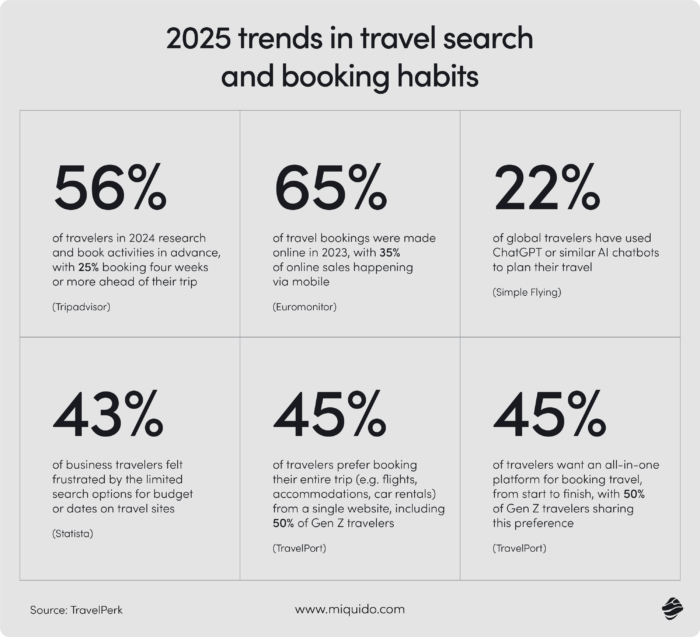
What is a travel search engine?
In a nutshell, a travel search engine is a tool that enables you to quickly plan specific aspects of your trip. It helps you find transportation, flights, tickets, and accommodations that meet your requirements without the need to sift through dozens of subpages and manually compare prices.
Instead of searching for offers each time, with a travel search engine, you see everything at a glance. What you find there can be immediately booked – either through the app or via a direct redirection.
Its key aspect? Refined search algorithms and seamless integrations. Travel search engines redirect you to other places where you can complete your reservation or purchase, and any disruptions can trigger massive user churn.
However, this is just a drop in the ocean of needs.
Let’s analyze what could contribute to the success of a travel meta search engine and identify niches with potential.
Why are travel search engines popular?
According to statistics, over 90% of travelers conduct their research online, and 82% make their bookings online. Travel search engines are popular because they simplify trip planning by integrating flights, transportation, accommodations, car rentals, and tours all in one place.
They also make it easier to focus on finding the best deals. People no longer have to rely on vacation days or rigid schedules, as travel search engines help them find attractive offers that airline websites often can’t provide due to date-centric searches.
Most travel engines also handle high demands with advanced filters, allowing users to meet specific needs—whether it’s sticking to a tight budget or planning a trip to multiple destinations.
Additionally, the language barrier is no longer an issue. Users can easily plan international trips with everything clearly presented, saving time on translations and ensuring they’re booking through trustworthy sources.
Planning your travel search engine
The most important thing to remember when creating a travel search engine is not to try to hit too many targets with one arrow.
There are already several travel search engines on the market. Users will return to yours if you offer them exactly what they’re looking for—something other platforms don’t have, or offer only in a limited capacity, because they’ve chosen to focus on broader, universal needs when developing their features.
Defining your niche and target audience
By understanding the needs of your users, you’ll know where to focus your efforts. Answer these questions:
- Are you targeting Gen Z and Gen Alpha, or millennials and Gen X?
- What will your focus be? (flights, transportation, accommodation, organized tours, local attractions, car rentals, travel packages, admission to tourist sites, other travel related services)
- What does travel mean to your user? How do they travel? Spontaneously or with a defined plan? Locally or globally? Long-term or weekend getaways? Budget-friendly or luxurious?
- When they use your travel search engine website, do they have defined plans, or are they looking for inspiration and the best offers before making a final decision?
- What is most important to them? Price, variety, offer comparisons, detailed information within the search engine, minimal steps from search to booking, etc.?
- Do they prefer to complete the booking process within the travel search engine (looking for a more comprehensive online service or travel agents like Kiwi.com), or would they rather book directly on the supplier’s website?
- What’s the main obstacle they face when completing a booking?
With answers to these questions, you’ll be able to precisely define your target group and tailor the requirements that will ensure the app’s success.
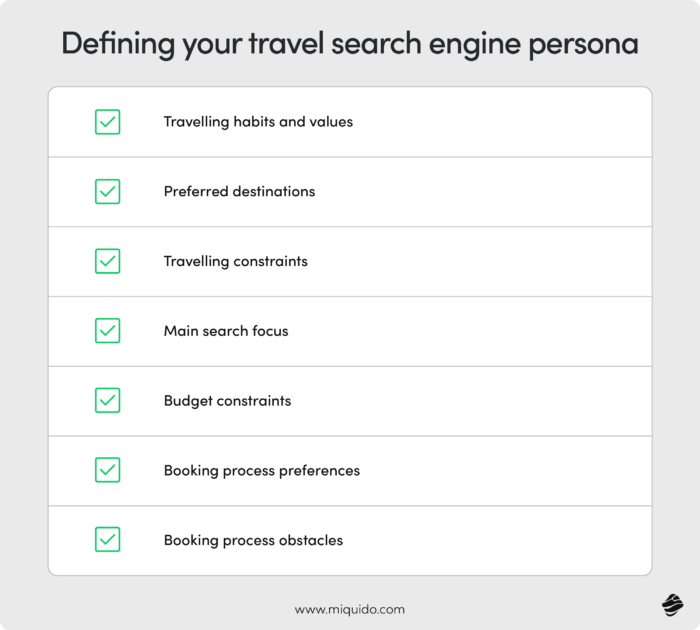
Choosing essential features for a travel search engine
Search filters
Users expect to refine their travel searches based on their unique preferences and needs, and that’s what the filters are for. They typically include options like destination, dates, budget, number of stops, flight class, and airlines, along with more specialized options like pet-friendly accommodations or accessibility features.
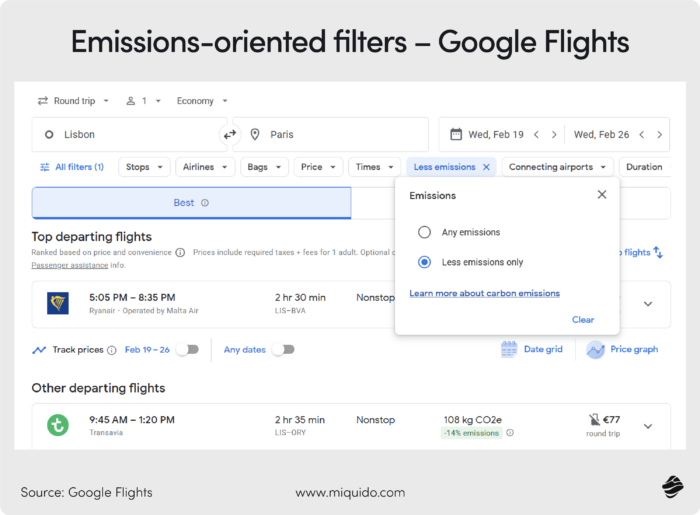
Including filters like weather or environmental impact can help gain extra points with eco-conscious travelers. For instance, some flight search engines, like Google Flights, offer its users “less emissions only” filter which enables finding routes with reduced carbon footprint.
More advanced filters, like those offered by Kayak, may accommodate the needs of travelers with special requirements. Think of the recent media storm around one of the key aircraft providers that makes passengers with fear of flying extremely vulnerable.
Tackling such specific needs with your filters could grant you new, loyal users.
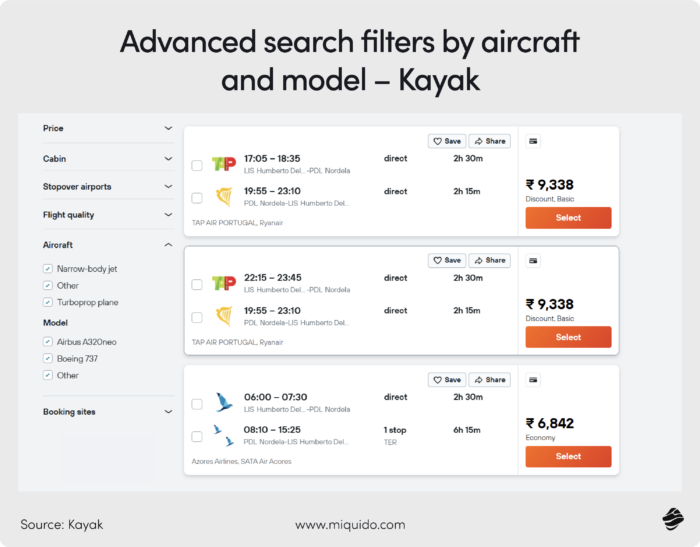
Price alerts
Travelers often want to keep track of fluctuating prices before making a decision. Price alerts allow users to receive notifications when prices drop for specific routes or destinations, making it easier to book at the most opportune time. Offering dynamic price forecasting based on historical trends can elevate the user experience.
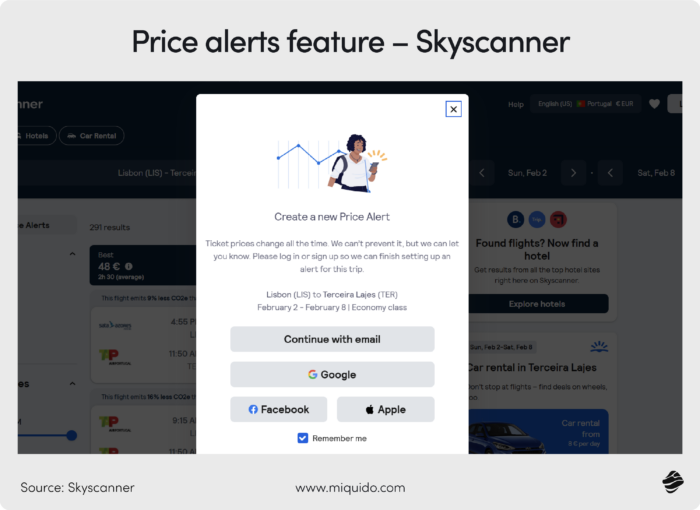
Multi-destination support
Many travelers prefer to book trips with multiple stops or complex itineraries. Multi-destination search options let users plan entire journeys in one go, allowing them to add and compare different flights or transportation options. A suggestion tool for nearby airports or alternative routes can increase flexibility and satisfaction.
Map view
Visualizing travel options on a map helps users understand the geography of their destinations and compare travel times and prices. Typically, this feature displays available flights or accommodations in relation to a map, giving users a spatial sense of distance.
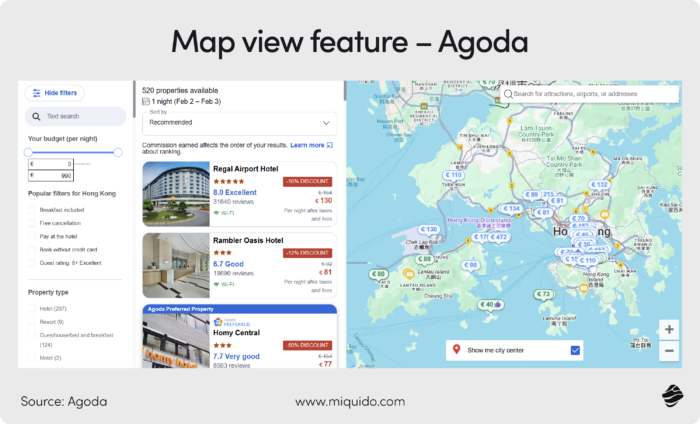
Integrating interactive maps with real-time data, such as flight delays or local events, can offer an edge over competitors.
Main challenge? Maximum visibility combined with easy navigation, both on web and mobile interfaces. Leave it to us – mapping is an area in which we have an extensive know-how, as the project for YouMap proves.
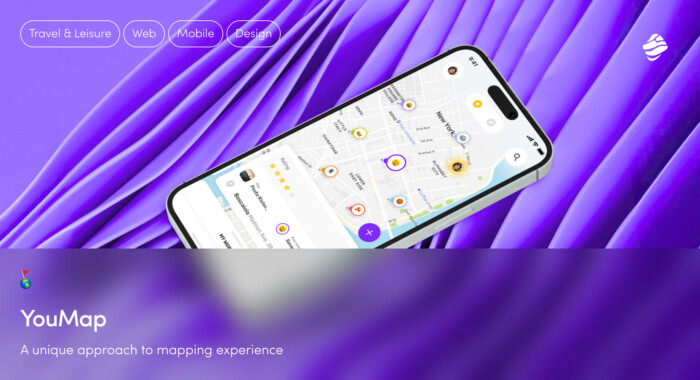
Flexible date search
Travelers with flexible schedules are keen to find the best deals within a range of dates. Flexible date searches let users see the lowest prices within a week or month, providing more opportunities to find affordable options. Offering a flexible time window for both departure and return helps users plan trips more freely. If you want to attract a growing target group of digital nomads, this feature is essential.
Review system
Travelers rely on reviews to guide their decisions, expecting transparency and reliability in ratings. Most platforms include user-generated ratings and reviews for flights, hotels, and car rentals, often with detailed comments and star ratings. Incorporating verified customer reviews with response options from businesses creates a more trustworthy experience, enhancing your reliability as a travel search engine provider.
Travel package bundles
Some travelers prefer to bundle flights, accommodations, and car rentals into a single, convenient package for greater savings. These bundles often come with discounted rates or exclusive perks, simplifying the booking process. Offering customizable packages that allow for added services like airport transfers or excursions could attract more users.
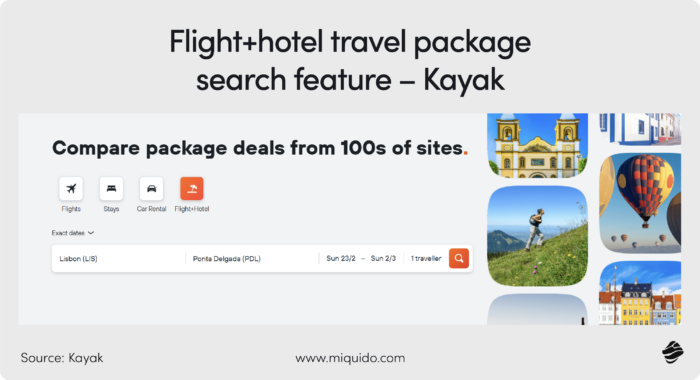
Last-minute deals
Spontaneous travelers look for discounted options even close to departure dates. These deals highlight available accommodations, flights, or tours that are still up for grabs at reduced rates, typically closer to departure. Featuring a “last-minute cancellation” section with real-time availability could appeal to users looking for immediate travel options.
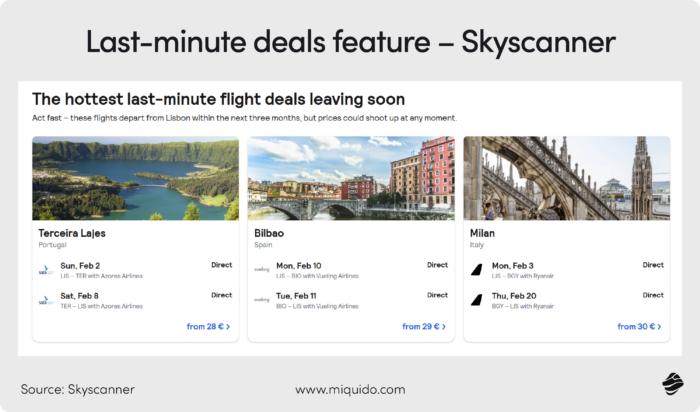
In-app booking
Travelers now expect to complete their entire booking process, from searching to final payment, within a single platform. Search engines typically provide an easy-to-use, mobile-optimized interface for booking all aspects of a trip directly through their app or website. Integrating an option for payment via digital wallets, or even cryptocurrency, can appeal to tech-savvy users.
Price comparison
Users like to see a range of options across different providers to make the best decision. Price comparison tools show results from various airlines, hotel chains, or rental services side-by-side, helping users make informed decisions. Including a “best value” metric that combines both price and user ratings can enhance decision-making, suggesting users a perfect middle ground.
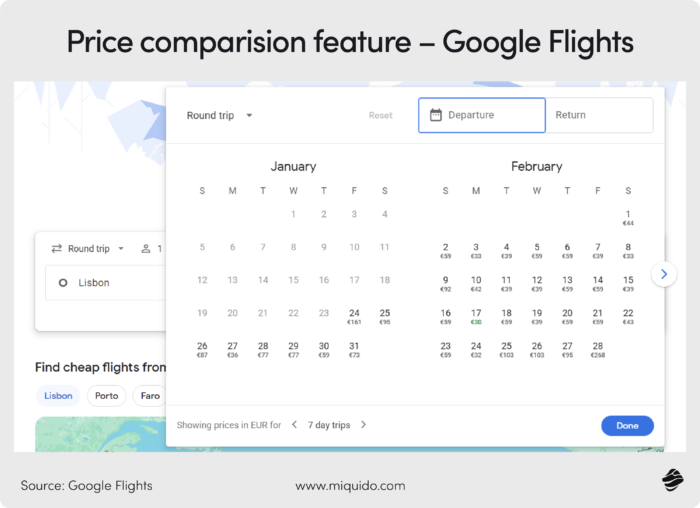
Local insights & recommendations
Today’s travelers want personalized tips that go beyond basic location details. Many platforms provide local recommendations for restaurants, activities, and hidden gems based on user preferences or expert advice. Enriching this feature with customizable itineraries or local event calendars can help users feel more connected to the destination.
Researching competitors and market trends
The travel search engine market is currently quite saturated, although there is still considerable room for innovation.
When planning the development of your innovative app, it’s worth considering the strong dominance of booking.com as a leading online travel service. The most visited travel and tourism website worldwide in December 2024, the platform has been focusing on accommodations since its inception, but it is much more than just a hotel search engine. Users can book car rentals, flights, and attractions through it.
The strong reputation of the platform enhances its popularity as a travel search engine, especially in the U.S., where it was the most popular flight search tool in 2024, alongside Expedia (according to the Statista Consumer Insights Global survey).
| Travel Search Engine | Launched | Most Popular | Main Focus | Standout Feature |
|---|---|---|---|---|
| Google Flights | 2011 | North America, Europe | Flight search, pricing trends | Integration with Google services, price tracking and predictions |
| KAYAK | 2004 | North America, Europe | Flights, hotels, car rentals, and package deals | Comprehensive comparison across various travel products (flights, hotels, cars) |
| Skyscanner | 2003 | Europe, North America, Asia | Flights, hotels, car rentals | Flexible search tools (e.g., search “cheapest month,” “everywhere” destination) |
| Tripadvisor | 2000 | North America, Europe, Asia | Reviews, ratings, and booking for accommodations, restaurants, and activities | User-generated reviews and extensive travel content (hotels, tours, etc.) |
| Trivago | 2005 | Europe, North America | Hotel search and price comparison | Focused purely on hotel comparison with a large database of listings |
| Momondo | 2006 | Europe, North America | Flights, hotels, car rentals | Transparent pricing and detailed search filters (e.g., multi-city options) |
Building such a strong reputation takes years and requires significant investments in advertising and partnership development. As a new market entrant, it is difficult to compete with the discounts and offers that such a large platform like booking.com can provide.
The key to success may be finding new needs that existing travel search engines are not addressing (yet).
For example, you could integrate less conventional transport options or focus on global extensive coverage of one specific option – like railway?
You also could offer users advanced filters, perhaps based on trends from social media. Or focus on sustainability and make it easier for users to plan trips with a minimal carbon footprint.
Alternatively, you could take a different route and provide them with the ability to find the best “last minute” deals. Look at the trends—over the past two years, related searches for “tonight” and “today” have grown by over 150% on mobile (Google, 2024).
Building the technical framework
Target defined, requirements set? Buckle up, because it’s time to set sail for implementation. Here is how we approach travel app development at Miquido.
Choosing the right technology stack
Since you are building a travel search engine, your priority will be fast, responsive user interfaces as well as fast and relevant search results.
Frameworks like Vue.js and React, which we work with alongside others, are known for providing these benefits. However, the final choice of tech stack depends on many factors. After getting familiar with your project and its objectives, we can help you find the solutions that best serve its success.
You may also consider integrating GraphQL for API management. It will enable efficient data retrieval, minimizing unnecessary requests and improving the app’s performance.
Setting up APIs for travel data integration
Travel search engines rely on real-time data, so choosing APIs that are reliable and fast is crucial. Look for providers with a proven track record of uptime and fast response times. Utilize caching mechanisms to store frequently requested data and reduce API call volume, improving response time for users.
To prevent slow service – a major cause of churn for travel search engines – be mindful of the API request rate limits. Rate-limiting techniques may help you ensure that users get their results at lightning speed.
As your user base grows, so will the number of API calls. Make sure your infrastructure is scalable to handle increased traffic. Cloud-based services like AWS or Google Cloud can help scale your backend as needed, allowing you to process more API requests without performance degradation.
Last but not least: API testing is your best friend! Before integrating, review the API documentation thoroughly to understand the endpoints, data formats, rate limits, and any potential restrictions or terms of use.
You’re ready to go!
Building a user-friendly interface
In the saturated online services digital sphere, the user interface is the arena where the final battle takes place.
You know from personal experience how it works: the user has neither the time nor the patience to fight with your interface. If it’s not optimized, they will simply move on to another provider, unless you offer truly unique features.
It’s good to know that 50.65% is the usual bounce rate in the travel industry. Reducing it to 23.8% for desktop and 36.5% for mobile would place you higher in this category than 80% of applications (Promodo, 2023).
The bar isn’t set that high. Remember, you are building a search engine—here, content matters most, not the packaging. The results need to be clear and readable, and the process from search to booking should raise no doubts.
Optimizing for user experience
Great user experience is the straightest highway to your target’s heart. While users may initially come to you for the features, it’s the experience that keeps them coming back. Which aspects should you optimize to provide the best search flow for your travelers?
Mobile-friendly design
Mobile is the present and the future—especially in the travel industry, where many searches and decisions are made on the go. 63.38% of global web traffic came from mobile devices in 2024. A mobile-friendly design should therefore be a top priority for success. Consider this: while 64% of individuals enjoy traveling, only 26% appreciate the booking process.
Designing search engines for mobile can be tricky due to the density of information. Users need to easily navigate destinations, dates, and complex filters within the mobile interface. Readability is equally important. Poor placement or an inadequate hierarchy of elements in your interface can compromise the entire user experience.
When it comes to mobile travel search engines, less is more. Don’t hesitate to limit or hide certain elements if it enhances readability and user experience. Dedicate extra time to optimizing interactive, detailed, and scalable features like map view—users will thank you for it.
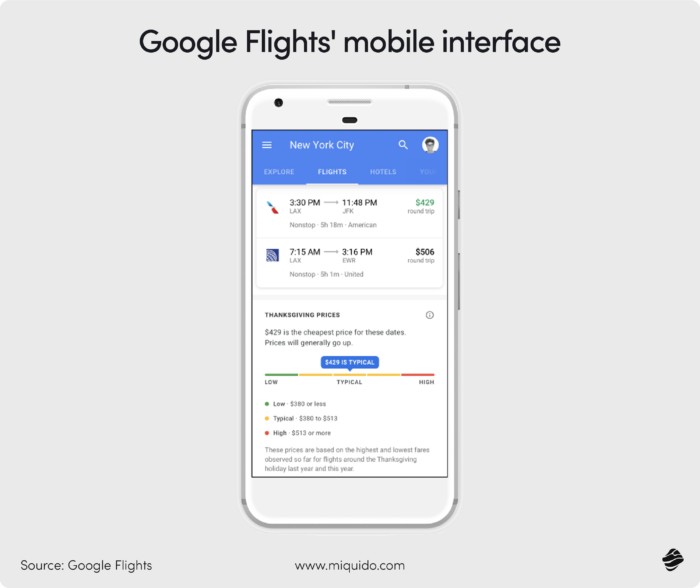
Speed and performance optimization
Nothing frustrates users more than slow-loading search results—when the momentum of travel planning disappears in an instant.
A search engine’s performance depends on many factors, and there are several ways to give it a boost. In addition to carefully choosing your tech stack, as we explained above, you can implement a microservices architecture with APIs. This guarantees modularity by separating search, user management, and booking into independent services.
What else? Here are some steps to ensure optimal performance:
- Use a cloud provider like AWS, Azure, or GCP with autoscaling enabled.
Why: Dynamically adjusts resources to handle traffic spikes, especially during holiday seasons. - Implement a GraphQL API for flexible and efficient data fetching.
Why: Allows clients to request exactly the data they need, reducing payload size and latency. - Cache search results with Redis or Memcached.
Why: Reduces database load and speeds up repeated queries for popular destinations. - Incorporate message queues like RabbitMQ or Apache Kafka for asynchronous task processing.
Why: Ensures smooth handling of high-load operations like notifications or data updates. - Adopt a CDN (e.g., Cloudflare, Akamai) for static content delivery.
Why: Speeds up web page loads by serving content closer to the user.
This is only a fraction of methods you could use to make your engine run at lightspeed. However, for it to favor your solution, the its individual aspects need to be taken into account.
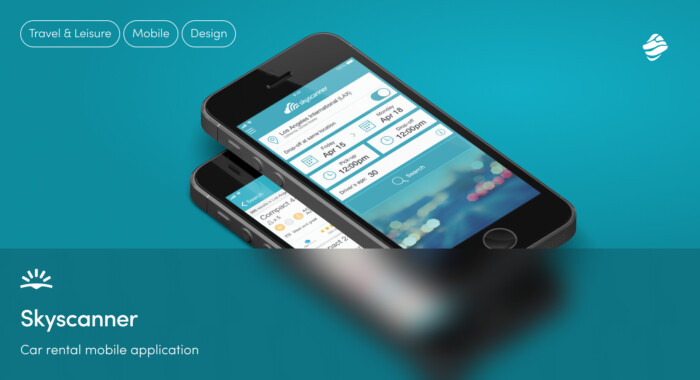
Personalization features
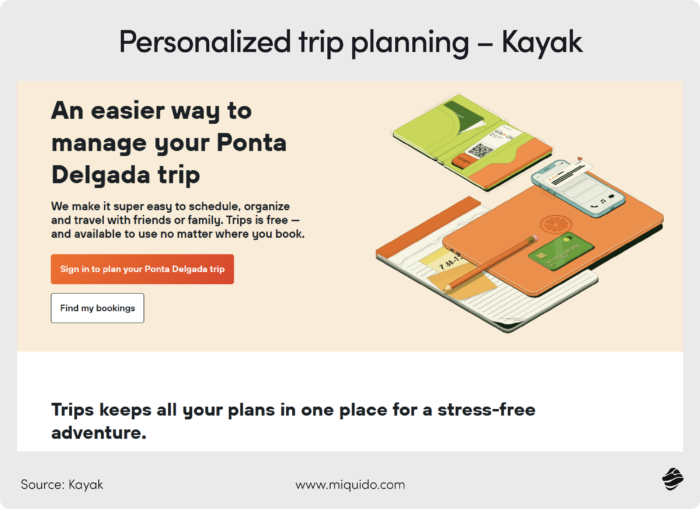
Marketing and launch strategy
As a search engine provider, your earnings will largely depend on effective marketing strategies. You’ll generate revenue mainly through affiliate commissions and PPC advertising, both of which heavily rely on the volume and quality of your traffic. Good architecture and UX are essential, but users also need to know about your solution and understand its benefits.
Building SEO-friendly content
Organic traffic is the most cost-effective, so it’s worth paying special attention to building it. SEO-friendly content is your best ally and key to fruitful cooperation with multiple online travel agencies.
How can you build it within the app?
- Create dedicated landing pages for popular travel destinations, hotels, or attractions, including detailed descriptions, images, and relevant metadata.
- Naturally incorporate high-value keywords into page titles, headings, meta descriptions, and content. Keywords like “cheap flights NY,” “ferry Morocco tomorrow,” or “apartments with AC Portugal” are examples of relevant terms to include.
- Facilitate contributing with keyword-rich user-generated content by adding reviews, ratings, and comments.
- Ensure your app is mobile-friendly with fast-loading pages, intuitive navigation, and AMP (Accelerated Mobile Pages) for blog content.
- Collaborate with travel agents, bloggers, influencers, and reputable travel sites for guest posts or mentions.
While you focus on creating great content, we’ll handle UI/UX and performance optimization, which are just as crucial for SEO in 2025.
Partnering with travel providers
Partnerships are the backbone of revenue for travel search engines. Take a look at the biggest players, like Skyscanner, which collaborate with hotels, airlines, car rental and travel companies to offer users access to the best deals.
These partnerships are built on an affiliate model, where platforms earn a commission for every booking made through their service. Additionally, many search engines provide paid placement in search results, giving partners greater visibility and access to a broader audience.
For more advanced integrations, like dynamic travel packages, these partnerships may even involve revenue sharing based on sales value. This approach allows travel search engines to maximize profits while offering users a wide selection and competitive prices.
Create the perfect travel companion with Miquido
As your project grows, so will your demand for expanding APIs, cultivating new partnerships and scaling for global markets. Automate travel business process with the help of our travel affiliate web developer talents.
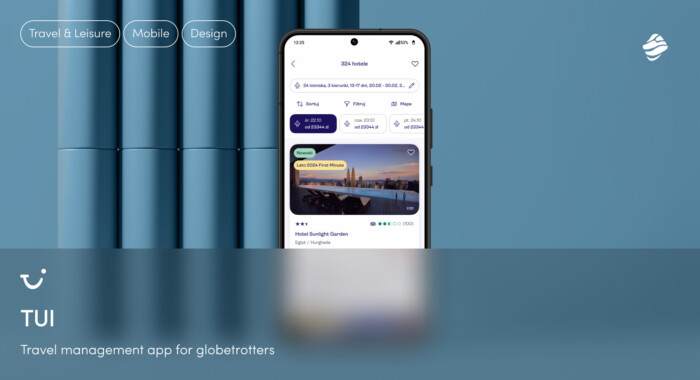

![[header] how to build a travel search engin – a blueprint for ctos and product leaders](https://www.miquido.com/wp-content/uploads/2025/02/header-how-to-build-a-travel-search-engin-–-a-blueprint-for-ctos-and-product-leaders.jpg)


![[header] top 15 travel app features](https://www.miquido.com/wp-content/uploads/2017/09/header-top-15-travel-app-features-432x288.jpg)
![[header] how to build a travel search engin – a blueprint for ctos and product leaders](https://www.miquido.com/wp-content/uploads/2025/02/header-how-to-build-a-travel-search-engin-–-a-blueprint-for-ctos-and-product-leaders-432x288.jpg)

